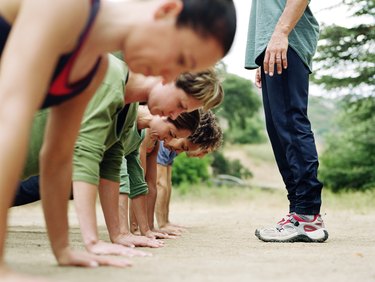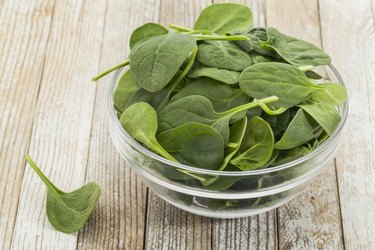
Engaging in regular physical activity may be one of the most important things you can do for your health. Exercising for 30 minutes or more at least five days a week can lower the risk of heart disease, improve bone and muscle strength and help control your weight, according to the Centers for Disease Control and Prevention. Incorporating a variety of activities into your workout routine can help you stay physically fit.
Aerobic Exercise
Video of the Day

Aerobic or cardiovascular exercises like brisk walking, jogging, swimming and bicycling help strengthen your heart because it keeps it pumping at a higher rate for an extended period of time. Aerobic activities also help manage blood pressure and cholesterol, strengthen the spine and prevent weight gain while improving your energy level and simply making you feel good, explains the University of Maryland Medical Center.
Video of the Day
Anaerobic Exercise

While aerobic exercise involves lower intensity sustained for several minutes or even hours, anaerobic exercises are short and fast, and they help increase muscle strength. Activities that involve quick bursts of energy such as sprinting or heavy weightlifting are defined as anaerobic. A combination of aerobic and anaerobic exercises are needed for the development of physical fitness, explains the University of Iowa Hospitals and Clinics.
Strength Training

Strength or resistance training can build stamina and help replace body fat with lean muscle mass, which encourages your body to burn calories more efficiently. Strength training also helps counteract muscle loss associated with aging. Pushups, pullups, lifting free weights or working out on weight machines are all examples of resistance-training activities. Exercises that work the major muscle groups should be performed two or three times per week for best results.
Stretching

Stretching is an important element in a fitness program. Stretching your body two or three times a week or after each aerobic or strength training workout can improve circulation and range of motion in your joints. Stretching can even promote better posture and relieve stress. Yoga poses, dancing, and touching your toes can effectively stretch your body.
Fruits and Veggies

A healthy diet that includes plenty of fruits and vegetables can promote physical fitness because it relaxes blood sugar that can help prevent overeating, explains Harvard School of Public Health. Most people should aim for at least 4 cups of fruits and veggies each day. Good choices include spinach and other dark leafy vegetables, or any produce that's red such as raspberries and bell peppers, or yellow or orange like melons, bananas and carrots.
Outlook

Regular exercise and a healthy diet can help you become more physically fit. Consider your personal goals, interests and possible barriers when developing a fitness program. Talk to your health-care provider before starting a new workout routine, especially if you've been inactive.
- Centers for Disease Control and Prevention: How much physical activity do adults need?
- KidsHealth; Why Exercise Is Cool; February 2009
- University of Maryland Medical Center: Exercise — Recommended Exercise Methods
- Harvard School of Public Health: Fruits and Vegetables — The Bottom Line
- Centers for Disease Control and Prevention: Physical Activity and Health